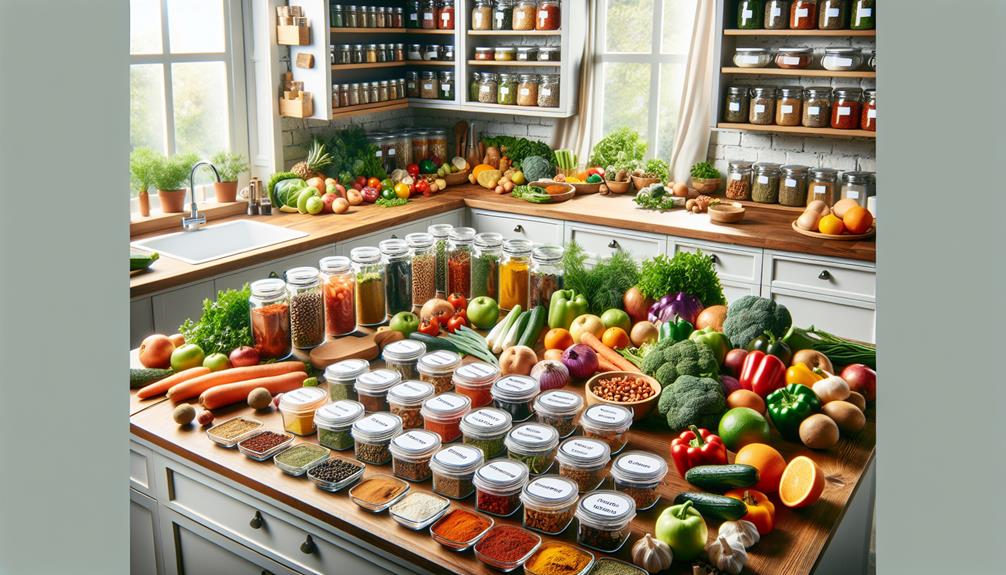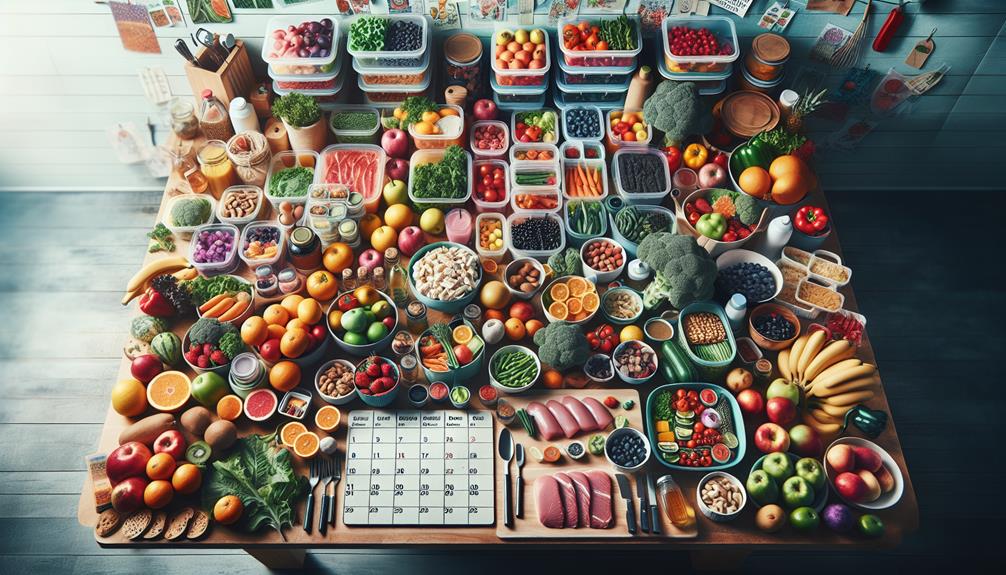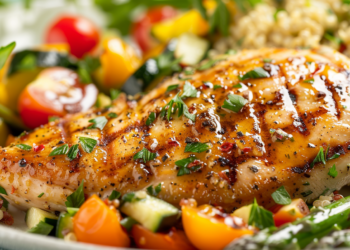Imagine waking up every morning feeling energized and ready to take on the day. Your skin looks clearer, your digestion is smoother, and those pesky cravings seem like a thing of the past. Sounds too good to be true, right? Well, that's exactly what the Whole30 Diet Challenge promises to deliver. But what exactly is this 30-day reset for clean eating, and how can it transform your relationship with food? Let's dive in and explore the ins and outs of the Whole30 Challenge, and discover how it can help you achieve a healthier, happier you.
Key Takeaways
- The Whole30 diet is a 30-day eating plan that emphasizes whole foods and aims to reduce inflammation.
- The diet eliminates certain food groups like grains, legumes, dairy, added sugars, and processed foods.
- Benefits of the Whole30 challenge include improved digestion, increased energy levels, and support for a healthy gut microbiome.
- To succeed on the Whole30 challenge, it is important to engage in meal planning, set realistic goals, try new recipes, and seek support from online communities or an accountability partner.
What Is the Whole30 Diet?
The Whole30 Diet is a 30-day eating plan that emphasizes whole foods and eliminates certain food groups to promote improved health and well-being. It is often referred to as the Whole30 Diet Challenge or the Whole30 Diet Reset. The main goal of this eating plan is to reset your body and eliminate potential food sensitivities or negative reactions to certain foods. By eliminating foods such as sugar, grains, dairy, legumes, and alcohol, the Whole30 Diet aims to reduce inflammation, improve digestion, boost energy levels, and promote weight loss. This eating plan encourages the consumption of high-quality proteins, vegetables, fruits, and healthy fats. It also emphasizes the importance of reading food labels and avoiding processed foods or ingredients. The Whole30 Diet is not meant to be a long-term diet, but rather a short-term reset for your body that can help you identify any potential food intolerances or unhealthy eating habits. It is important to note that this eating plan may not be suitable for everyone, especially those with specific medical conditions or dietary restrictions. It is always advisable to consult with a healthcare professional before starting any new diet or eating plan.
Benefits of the Whole30 Challenge
As you embark on the Whole30 Challenge, you can expect to experience a wide range of benefits that go beyond simply resetting your body and identifying potential food intolerances. The Whole30 program focuses on eliminating certain food groups for 30 days to promote clean eating and improve overall health. Here are two key benefits you can expect to see during the challenge:
| Benefit | Description |
|---|---|
| Improved digestion | By cutting out processed foods, added sugars, and potential irritants such as grains and dairy, you may notice improvements in your digestion. Many people report reduced bloating, gas, and stomach discomfort. The emphasis on whole, nutrient-dense foods can also support a healthy gut microbiome, which plays a crucial role in digestion. |
| Increased energy levels | The Whole30 Challenge encourages you to fuel your body with nutrient-rich foods, which can provide a steady source of energy throughout the day. By eliminating foods that may cause energy crashes, such as refined sugars and processed carbohydrates, you may experience more sustained energy levels. Additionally, focusing on whole foods can help stabilize blood sugar levels, preventing energy spikes and crashes. |
These benefits can have a significant impact on your overall well-being, helping you feel better both physically and mentally. Improved digestion and increased energy levels are just a couple of the many positive outcomes you can expect from committing to the Whole30 Challenge.
How to Prepare for the Whole30 Challenge

To effectively prepare for the Whole30 Challenge, consider implementing these key strategies:
- Meal Planning: Planning your meals in advance is crucial for success during the Whole30 Challenge. Take some time each week to create a meal plan, including breakfast, lunch, dinner, and snacks. This will help you stay on track and avoid making impulsive food choices.
- Grocery Shopping: Before starting the challenge, make a comprehensive grocery list based on your meal plan. Be sure to include plenty of fresh fruits and vegetables, lean proteins, and healthy fats. Avoid processed foods, added sugars, and grains. Having a well-stocked kitchen will make it easier to stick to the Whole30 guidelines throughout the month.
- Food Preparation: Spend some time prepping your meals and snacks in advance. Chop vegetables, cook proteins, and portion out snacks for the week. This will save you time and make healthy eating more convenient, especially during busy weekdays.
- Stock Up on Whole30 Essentials****: Take inventory of your pantry and ensure you have all the necessary staples for the challenge. This may include coconut oil, ghee, almond flour, compliant seasonings, and canned goods like tomatoes or coconut milk. Stocking up on these essentials beforehand will make it easier to follow the Whole30 guidelines without feeling deprived.
What to Eat (and Avoid) on the Whole30 Diet
Now that you have effectively prepared for the Whole30 Challenge, it's important to understand what foods to include in your diet and which ones to avoid. The Whole30 Diet focuses on clean eating and eliminating certain food groups to promote overall health and wellness.
During the 30-day challenge, you should focus on eating whole, unprocessed foods. This includes lean proteins such as chicken, turkey, and fish. Incorporate plenty of vegetables into your meals, including leafy greens, cruciferous vegetables, and colorful options like peppers and tomatoes. Fruits are also allowed, but it's best to opt for those with lower sugar content like berries.
On the Whole30 Diet, it's essential to avoid certain food groups and ingredients. These include grains, legumes, dairy, added sugars, and processed foods. This means saying goodbye to bread, pasta, rice, beans, peanuts, soy, milk, cheese, yogurt, and any foods or beverages containing added sugars or artificial sweeteners.
To make meal planning easier, you can find various Whole30 Diet recipes online. These recipes often use whole ingredients and provide a wide range of options for breakfast, lunch, dinner, and snacks. By following the Whole30 Diet meal plan and incorporating these recipes, you can successfully complete the 30-day challenge and experience the benefits of clean eating.
Tips for Success on the Whole30 Challenge

For optimal success on the Whole30 Challenge, it is crucial to implement these evidence-based tips and strategies:
- Meal Planning: Plan your meals in advance to ensure you have compliant options readily available. This will help you avoid making impulsive food choices that may derail your progress. Take time each week to create a meal plan, make a grocery list, and prep ingredients ahead of time.
- Stay Motivated: Find ways to keep yourself motivated throughout the 30-day challenge. Set realistic goals and track your progress. Celebrate small victories along the way to stay motivated. Join online communities or find an accountability partner to provide support and encouragement.
- Explore New Recipes: The Whole30 challenge can be an opportunity to try new foods and recipes. Experiment with different flavors and ingredients to keep your meals exciting and enjoyable. Get creative and find healthier alternatives to your favorite dishes. This will help prevent boredom and make the challenge more sustainable.
- Focus on Non-Scale Victories: While weight loss may be a goal for some participants, it's important to remember that the Whole30 challenge is about more than just numbers on the scale. Pay attention to how you feel physically and mentally. Notice improvements in energy levels, sleep quality, digestion, and overall well-being. These non-scale victories can be powerful motivators.
Frequently Asked Questions
Can I Drink Alcohol on the Whole30 Diet?
Yes, you can drink alcohol on the Whole30 diet. However, it is recommended to avoid it as it can hinder your progress. Opt for vegetarian/vegan options instead for a healthier choice.
Is the Whole30 Diet Suitable for Vegetarians or Vegans?
The Whole30 diet provides vegetarian options and vegan alternatives, making it suitable for those following plant-based diets. It emphasizes clean eating and excludes certain food groups for 30 days to reset your eating habits.
Can I Use Artificial Sweeteners on the Whole30 Diet?
No, you cannot use artificial sweeteners on the Whole30 diet. This diet emphasizes clean eating and avoiding processed foods. Artificial sweeteners are considered to be processed and are not allowed during the 30-day challenge.
Will the Whole30 Diet Help Me Lose Weight?
The Whole30 diet can help you lose weight by promoting clean eating and eliminating processed foods. It has numerous health benefits, but to maintain weight loss after completing the diet, it's important to continue making healthy food choices and stay active.
Can I Eat Out at Restaurants While on the Whole30 Diet?
Yes, you can eat out at restaurants while on the Whole30 diet. Look for options like grilled meats, steamed vegetables, and salads with dressing on the side. Just be mindful of ingredients and ask for modifications if needed.
Conclusion
In conclusion, the Whole30 diet challenge offers a 30-day reset for clean eating. It provides numerous benefits such as improved digestion, increased energy levels, and weight loss. One interesting statistic to note is that a study found that participants who completed the Whole30 challenge reported a decrease in cravings for unhealthy foods by 89%. This highlights the effectiveness of the program in promoting a healthier lifestyle and making long-term dietary changes.













